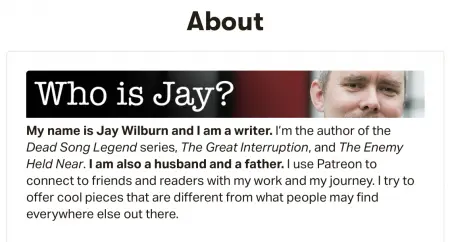Patreon.com is a platform for creators of all types to share work with a dedicated audience in a subscription format. Supporters of particular creators on Patreon are called patrons. Rewards for support can be physical things that are mailed or digital work that is unlocked. Support can begin at as little as a dollar a month and moves up through tiers for higher-level supporters and content. Patreon includes pages from visual artists, filmmakers, musicians, podcasters, streamers, adult star “only fans” personalities, authors, and more.
Patreon came into the consciousness of many in the writing community at an odd time. Today, crowdfunding and direct artist support is far more ubiquitous with platforms like Twitch and YouTube Gaming, where gamers are supported by donations from fans. Crowdfunding existed well prior to Patreon, but was not as broadly, and it wasn’t as big a part of the writing and publishing world as it is today.
Independent authors and small press publishers had just started experimenting with crowdfunding sites like GoFundMe and Kickstarter around the same time many writers began exploring Patreon. Prior to this, the big shake-ups in publishing included ebooks, the expansion of self-publishing, and the rise of Amazon as a primary distributor for everything. Even with these structural and technological changes, legitimate writing income was largely seen as writing a piece, selling the piece, and being paid as a result of readers buying a unit of the published work. You repeated this process and worked for volume. Many authors were still trying to find their place on social media as a platform for promotion and branding. Many are still trying to figure that out.
There was mixed success with crowdfunding in those days. For some indie and small presses, it is still a regular part of funding their anthologies. There is some pushback in writing circles around this, and Patreon sometimes gets swept into those discussions. Even in a world of streaming entertainment, most authors and publishers still think of writing income in terms of writing a book, publishing a book, and people buying singular copies of the book.
Does it Work?
Many authors found no success on Patreon, especially at the beginning. We understood subscribing to Netflix, but why would someone subscribe to an author monthly? Wouldn’t I just buy their books if I was interested? A number of writers abandoned the site when they got no supporters, and they then distributed the work they’d accumulated on there in other ways.
Some of us stuck it out, sometimes putting up work for no one or only one or two patrons. There is a theory about the “first follower.” If one person does something, they are just some weird guy doing something alone. If a second person joins in, then it becomes a thing in other people’s eyes. More people are likely to join in and it builds from there.
I make a little bit of money from Patreon, and I’m working to build that up in terms of quality of content offered and number of supporters. My page is Patreon.com/JayWilburn.
The way I approach Patreon is I offer a robust range on content to all patrons. Everyone, including the people at the dollar level, get a lot of stuff. I have found that people who pay more than a dollar are really interested in supporting the person, investing in you, rather than in the stuff. Most of them aren’t looking to get a lot of stuff mailed to them. There are probably exceptions to this generality, of course.
People who support on Patreon are generally interested in access. They like previews of material before anyone else, exclusive work just for them, behind the scenes items, and special connection to the creator. It is possible to set up chats and livestreams, and that works well for people who have a lot of supporters. Giveaways are sometimes good and can build loyalty and value.
People like a page with lots of content, but most often new patrons look at what is new instead of going back to read everything.
If you have no supporters agree to come on for a dollar a month and you don’t know how to get them to, it is tough to argue the platform works for you.
What Can I Offer?
There are a number of things authors have commonly offered on their Patreon pages.
• Serialized Novels
Each month you post a new chapter. Eventually, you can edit and publish the novel for the public as well.
• Short Stories
A lot of readers enjoy a quick read. Without having to order an entire collection, they can read a short story you posted especially for them along with everything else you offer. They can read it on the site or in their email.
• Behind the Scenes
This can mean a lot of things from seeing first drafts, works in progress, story pitches, details others don’t get, and more.
• Previews
Being able to see things before anyone else is a big perk of being a patron.
• Exclusive Videos
Seeing and hearing from a favorite creator when no one else can is something special. The better you get at creating videos, the more appeal they have, but a simple video can still build a feeling of connection between you and your patrons. Videos of readings for them can work, too.
• Direct Access
Ultimately, someone who pays monthly is investing in you. They believe in you as a person as much as they do your work. You don’t have to pull back the curtain on your entire personal life, but you can share things that help make patrons feel they are part of a community as they support you.
• Tangible Rewards
You can create something physical that you can mail to patrons as either a one time perk or a regular thing. Armand Rosamilia has a tier where supporters get to choose a book monthly for him to sign and mail. This is in addition to all the other content he offers.
• Things Unique to You
All the suggestions above seem great, but if these things are common among those successfully using Patreon and those who never get a single patron, this may not help at all. The X factor is what is unique to you. What skills do you have to offer that no other author can? Jessica McHugh creates blackout poetry. Some authors are also visual artists, podcasters, musicians, or have some other interests that can lead to unique content.
I’m fairly prolific. I offer months where I post a new short story every day for the entire month. I usually do this in October and December. John Urbancik is a prolific short story writer and offers many great stories monthly and did a full month one September, too. I podcast and I’m on Twitch. I’ve started editing video content with a little better quality, including unique material from some of the authors I interview along with writing I created live on video. Soon, I’m doing a collaborative project with another author on Patreon.

How are Other Authors Making it Work?
I can share what I’ve seen on some of the Patreon pages I personally support.
Brian Keene switched his Patreon to a single tier. You can support him for any amount of money, but his only tier is the five dollar level. At that level, he offers something every single day. Sometimes it’s behind the scenes. Some days are serial novels. He shares short stories and more. He indexes everything from his Patreon at his website for easy access and discovery. Keene’s uniqueness comes from the years he has written in a wide range of genres and also the place he holds in the horror community. He has a lot of stuff he can share and other writers will follow him for his insights.
Armand Rosamilia offers serial novels, short stories, and behind the scenes on what he is writing every day each week. He holds a position of mentoring several authors, so many people are interested in what he does and how he does it.
John Urbancik is an accomplished author and photographer. He shares his work from both mediums on his site and his work never disappoints.
Perpetual Motion Machine Publishing offers subscriptions to the work they produce, early access to podcasts, writing prompts and editing, and exclusive written content.
Crystal Lake Publishing offers a lot on their Patreon as well. Publishers may have more resources than an individual author, but you can borrow ideas or take inspiration from what they do. They have writing advice, flash fiction contests, previews, exclusive author interviews, an exclusive horror series with multiple writers, and more.
Is it Worth it for Authors Without a Huge Following Already?
An author with thousands of fans willing to join their page really doesn’t have to ask whether it is worth it. So, the real question is whether Patreon offers a platform that is worth it for an author building an audience. That’s a tougher question.
For any platform, there are some core questions that need to be answered first. Do you have the time and desire to develop a vibrant Patreon page? If the answer is a hard no, then you are out. Next, can it be integrated or compliment the work and platforms you are already using? If the answer is yes or even maybe, then there may be potential here for you.
If writing one chapter a month on an extra novel fits your schedule, you can use that and have another book for release down the line. Old trunk stories or old published stories can provide content. Patreon is a good laboratory for experimenting with stories or writing styles that may not fit anywhere else, but patrons like to get something new, weird, different, and special. You might not sell that piece, but writing it anyway for Patreon gives you practice that may be valuable later. If you create content for other platforms and can share it early on Patreon, that works. If you have the ability to create content in advance, schedule it out, and then maintain it as you work ahead, then it may not be overwhelming for you.
How much is enough to make it worth it for you? Looking at the work you need to put into it along with what you’re already doing, is a couple supporters enough to keep you working on it and building it? Is it worth it to have no supporters for a while as you create content to draw them in? If you could build it up to a steady 100 or 200 dollars a month, is that worth it, as you work to build up from that plateau? If the answer is no to these questions, then you’re probably out.
I answered yes to those questions and I’m in the process of building up my Patreon. It works with my other platform development and I’m experimenting with ways I can use it differently and promote my traditionally written work as well.
Arguably, most authors are not successful with Patreon, but that’s true of everything in writing. We’re all working to be the exception. Patreon is part of that effort for me.

About the author
Jay Wilburn lives with his wife and two sons in beautiful Conway, South Carolina. He is a full-time writer of horror and speculative fiction. Jay left his job as a teacher to become a full time writer and has never looked back. Well, that’s not entirely true. He wants to be sure he isn’t being followed, so he looks back sometimes.








